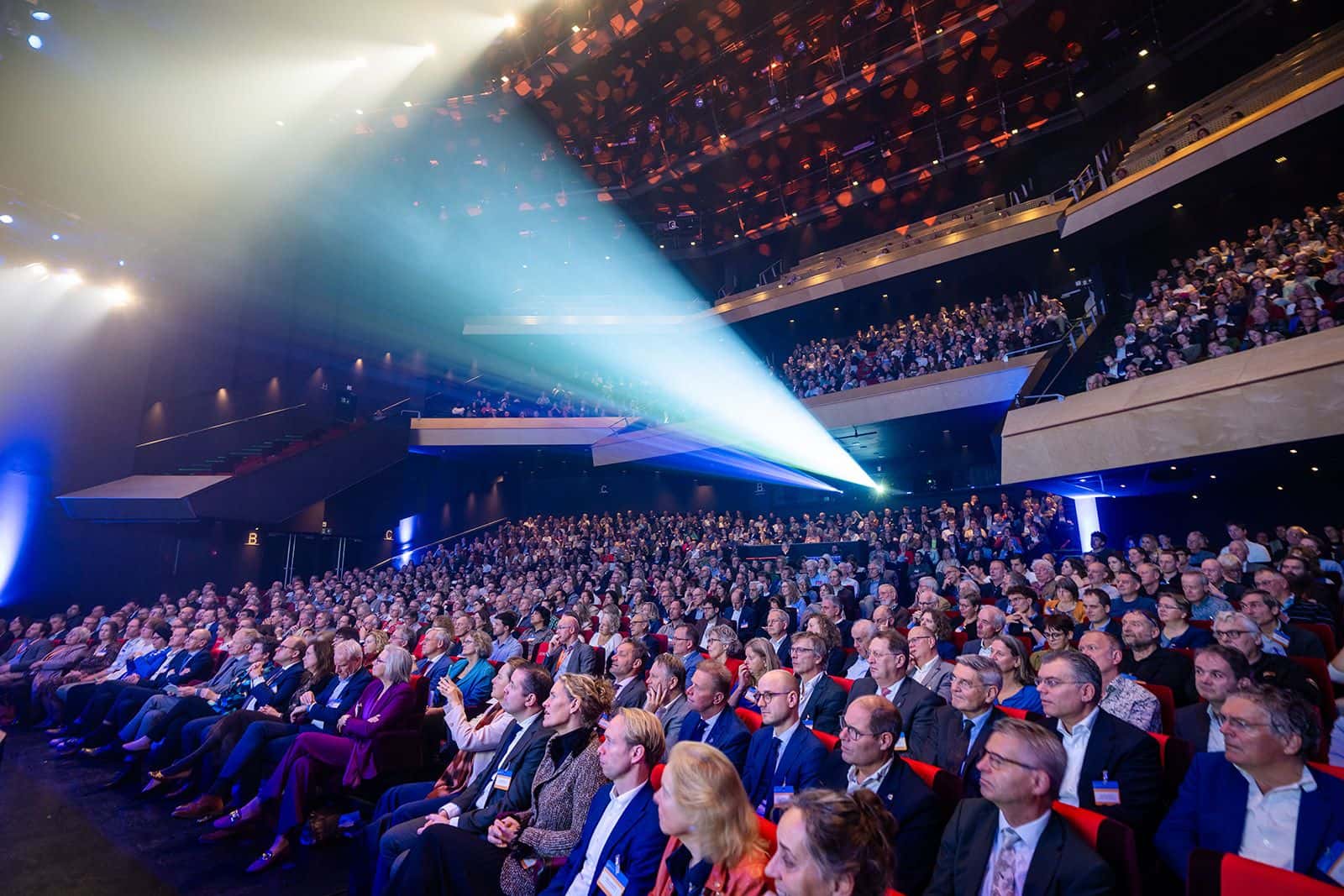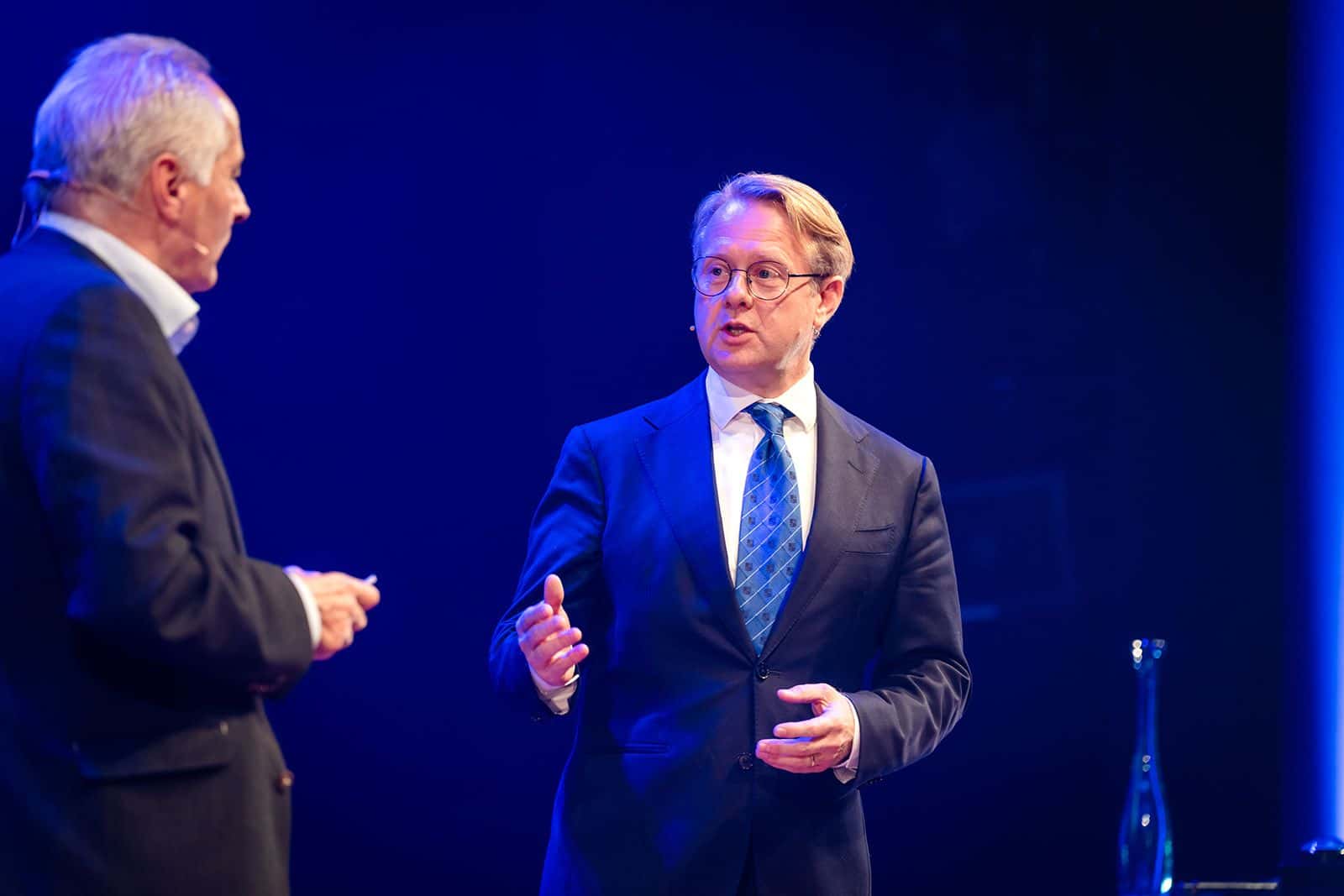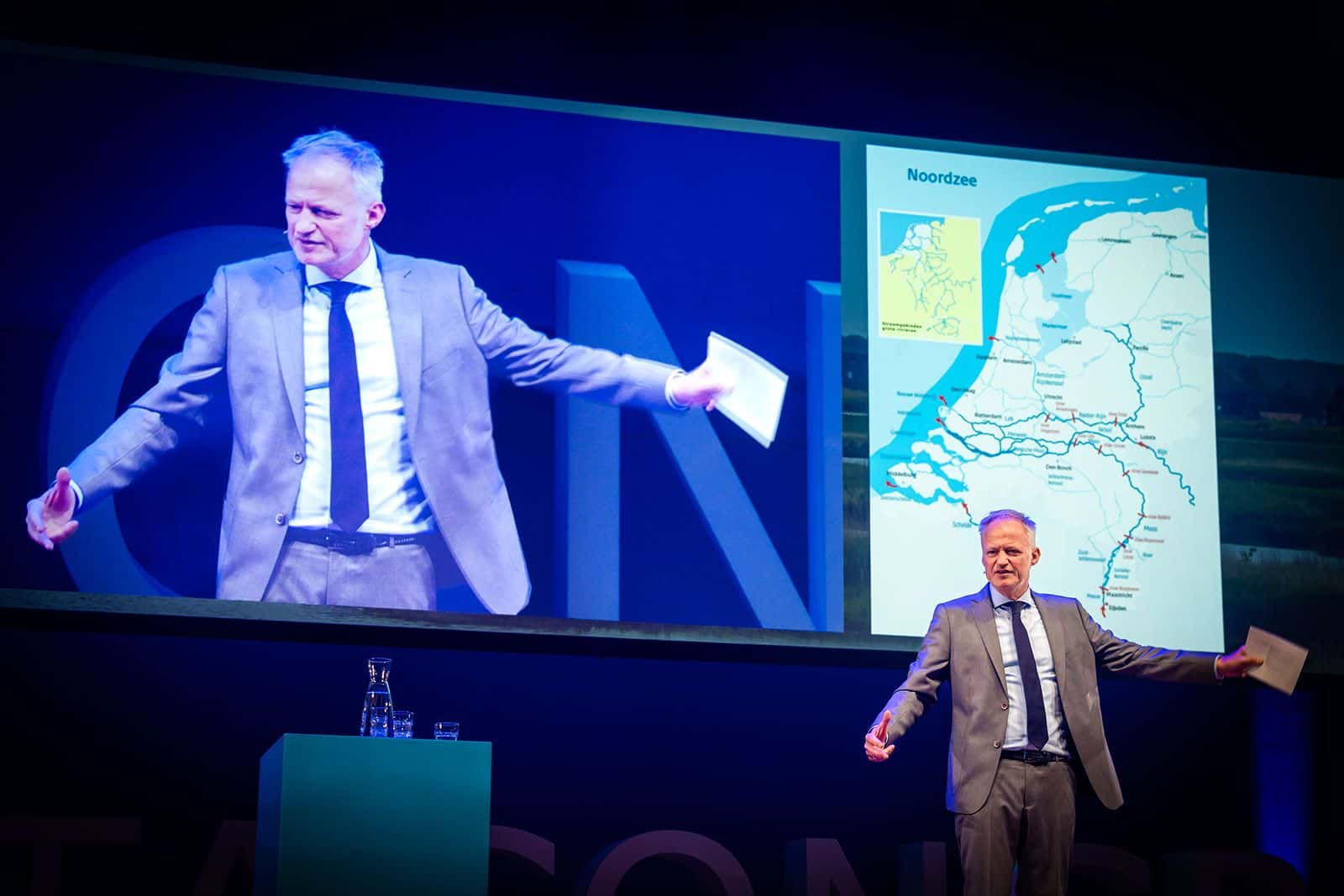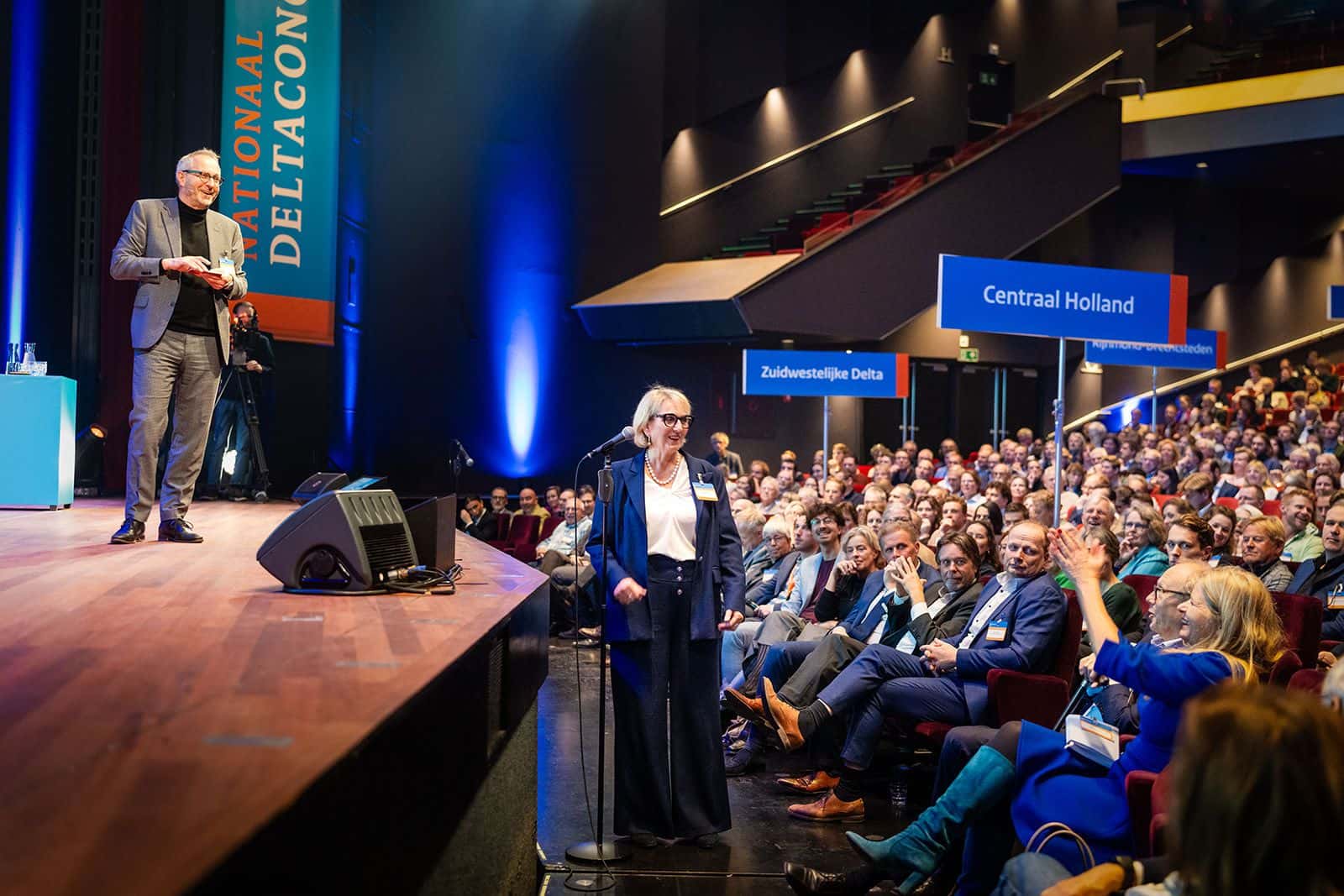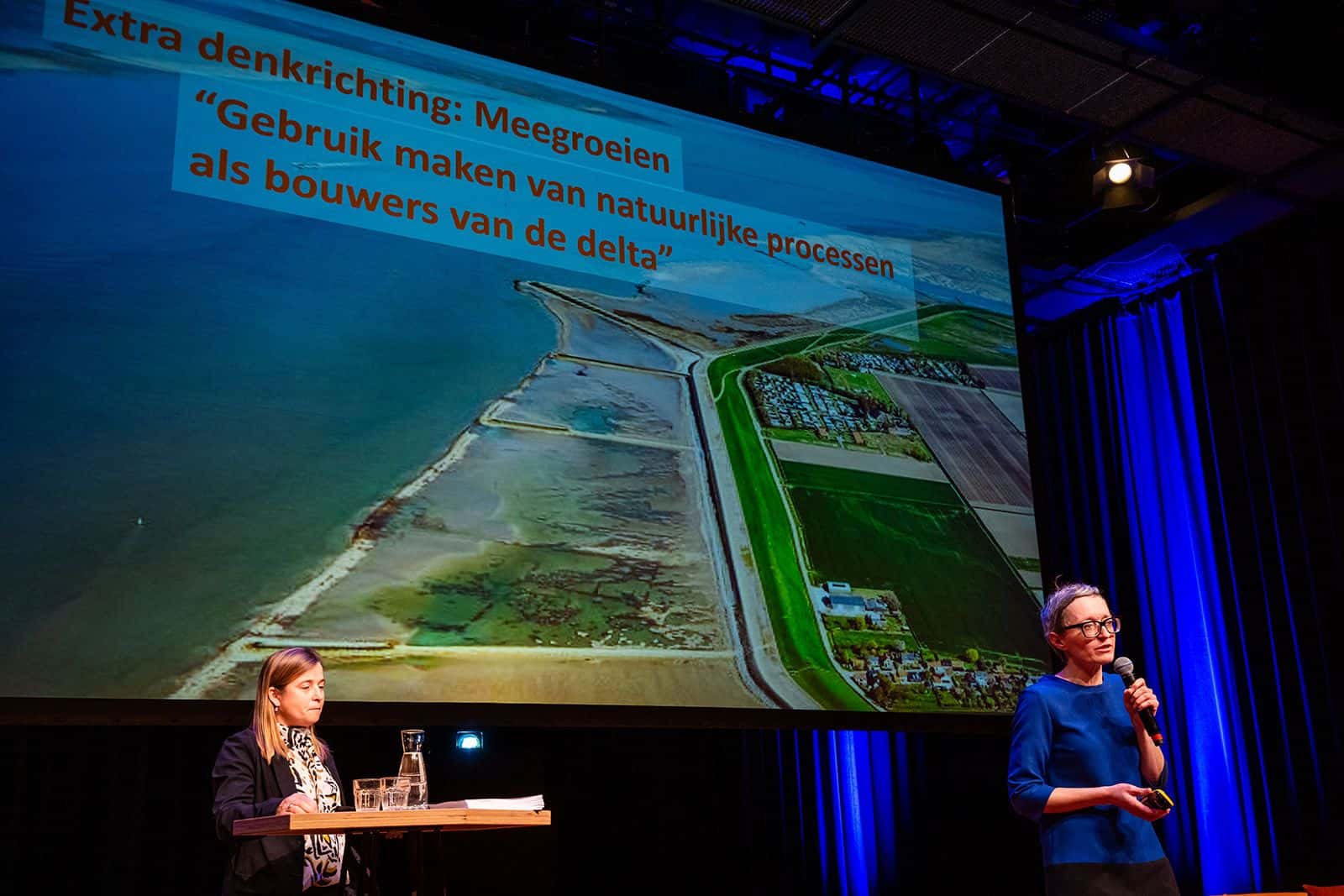Traditionally, people have placed great trust in ‘the Netherlands, land of water’ – and rightly so. But there are limits to what we can do to keep our country safe and climate-resilient in the long term. That’s why we must make bold choices now, join forces, and take responsibility ourselves. That was the message heard at the 16th National Delta Congress, held on November 13 in Breda.
It was a powerful message for the 1,300 attendees at the Chassé Theater and the 300 participants online – but there was also an undercurrent of optimism: we can do this, as long as we are united. If it can be done anywhere, it’s here in the Netherlands. Our governments, knowledge institutions, civil society and businesses are uniquely equipped to tackle these major challenges – as became clear during this National Delta Congress. “As long as we work together”, said Delta Commissioner Co Verdaas.
Greater preparedness
Moderator Tom van ’t Hek observed that “there is a great deal of trust in all of you, in the water sector. People tend to think, ‘We’ve got this water business under control.’ And that’s true – we’ve managed it for centuries – but it doesn’t happen automatically.”
A lot is going well in our water world, agreed Minister Robert Tieman of Infrastructure and Water Management. He noted a strong sense of urgency, but also called for greater preparedness – both among citizens and governments. “There’s still much room for improvement, because collaboration is not always a given.”
Minister Tieman also emphasized the importance of the “hands and feet” who carry out the work. “We need the engineers, but just as much the technically skilled professionals. We have to better involve young people in our wonderful water sector.”
A new reality
Delta Commissioner Co Verdaas joined the Minister in stressing the importance of preparedness. “Where resilience is greatest, there are the fewest victims. This also has implications for our message as government: we want to maintain trust, but we also have to make clear that there are limits to we can do. People do need to be prepared.”
We must come to terms with a new reality, Verdaas continued. “We are facing challenges that cannot be solved by one measure alone, only through a combination of many. It’s the interaction between measures that will make the difference. This calls for intense cooperation.”
At the same time, he noted, the pressure is mounting to take into account the longer term. “This means making tough choices. Attempting to maintain every priority simultaneously will mean that we’re spreading our efforts too thin.” Some realities will simply have to be accepted, Verdaas continued. “No matter what innovations we come up with, we’ll inevitably face more salinization”, he named as an example. “And in the end, we will increasingly face freshwater shortages. This is not a pleasant message, but it’s the only one to convey.”
Delta Film
During the Delta Congress, the new Delta Film premiered. The film focuses on the management and protection of the River Meuse and other Brabant waters, and on the challenges of dealing with both too much and too little water.
In the film, various stakeholders – including an inland fisherman, a landscape architect, and a regional drought coordinator – share their work and their love for the waters of Brabant. Meanwhile, we see images of the river, historical photos, nature reserves, and urban projects that illustrate how water safety, nature, and society come together.
Ray of Sunshine Award for ‘Farmer in Nature’
Each year, the Ray of Sunshine Award is presented at the Delta Congress – the annual prize for exemplary climate projects. This year’s winner, chosen in real time at the Congress in Breda, was Boer in Natuur (‘Farmer in Nature’). The initiative serves as a testing ground for innovative agriculture, with special attention to natural soil development. Boer in Natuur demonstrates that farmers don’t have to wait for change – they can take the lead themselves in building a climate-resilient future.
“Take action – go do something. Plant a tree. And eat organic food: it really makes a difference”, said Wilco de Zeeuw of Boer in Natuur when receiving the award. “Don’t get gloomy. Take action, drink good wine, and go dancing.”
Keeping pace with sea-level rise
“I already felt quite safe in this country – and now I feel just a little safer”, said moderator Tom van ’t Hek at the close of the plenary session.
Throughout the afternoon, participants joined various activities and networking opportunities. A highlight was the presentation of the report ‘Meegroeien’ (‘Keeping pace with sea-level rise’), which explores a new way of thinking in which nature itself helps protect our country from the rising sea. Alex Hekman of Sweco, project leader of the consortium that prepared the report, presented the first copy to Minister Robert Tieman and Delta Commissioner Co Verdaas. It is the fourth and final part of the overarching report ‘Ruimte voor zeespiegelstijging’ (‘Room for sea-level rise’).
Breakout sessions
The rest of the afternoon featured twelve breakout sessions on topics such as the Reassessment of the Delta Programme, working together to create space for water, the sponge effect, water and soil as guiding principles, and nature-based solutions as a fourth approach to addressing long-term sea-level rise.
Reports of these sessions and the plenary session will soon appear in a special edition of Delta News, available on the Delta Programme website.
Excursions
According to tradition, local partners organized a series of field excursions the day before the Congress. This year, participants could choose from five.
A boat tour along the Wilhelmina Canal, the Amertak, and the Donge explored the question: is there an alternative to dike reinforcement? In the City of Breda, participants traveled by boat and on foot to locations where green space and water play key roles. Another excursion visited three stream valleys, crossing briefly into Flanders, focusing on ‘water and soil as guiding principles’ and how this works in practice.
The entrepreneurial Brabant tour visited a castle and a farm, where local entrepreneurs each contribute in their own way to a climate-resilient region. The fifth excursion showcased two pioneering water projects: Brabant Water demonstrated how drinking water is produced from brackish groundwater, while theme park ‘De Efteling’ highlighted its efforts in circular water use.
